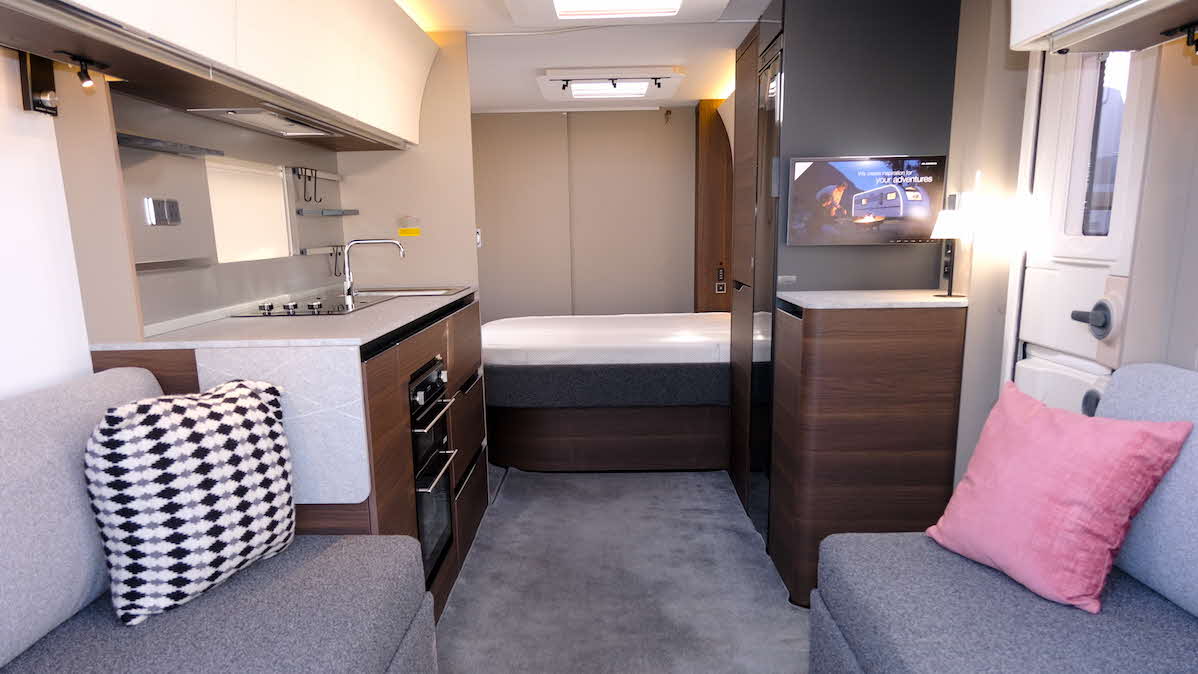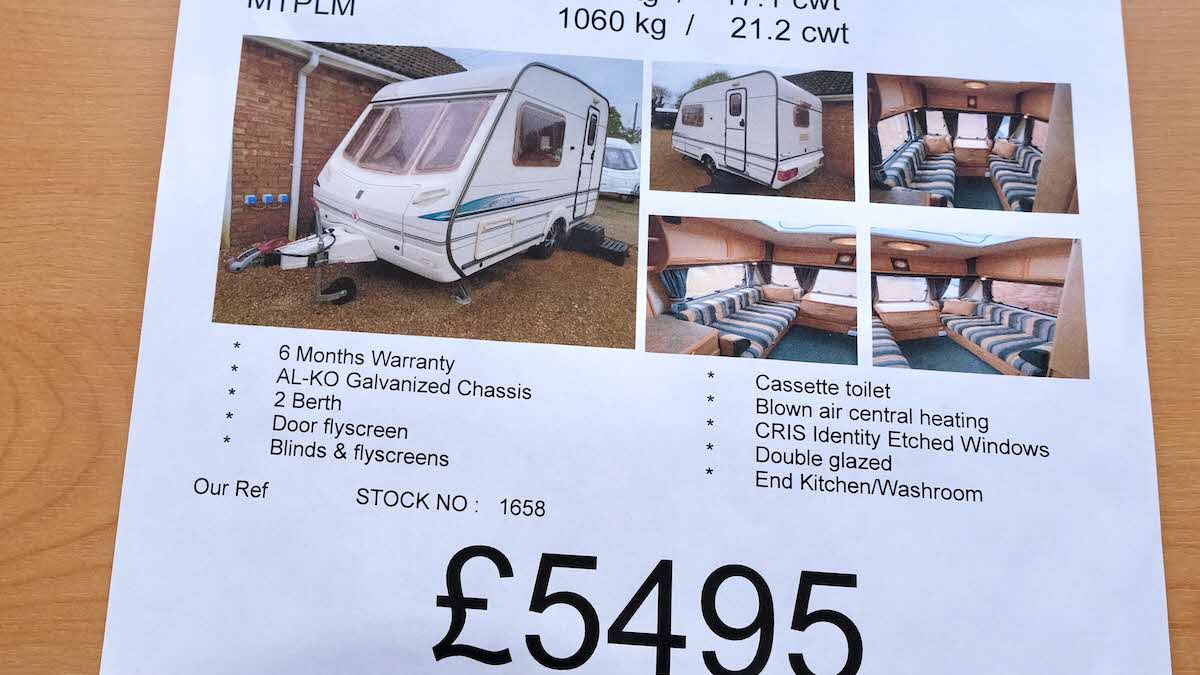New and used
Browse for bargains from thousands of new and used vehicles for sale, or sell your caravan, motorhome, towcar or accessories.
Buy and sell nowThe start of a new year often prompts thoughts about upgrading your outfit. Rob McCabe offers his expert advice on buying new or second-hand caravans
So, you’re in the market for a new caravan? While more experienced readers may not need a steer from me on where to start with this, we know that a raft of newer Club members are dipping their toes into the caravan waters. For them, the dawn of another year is often the time to upgrade to a newer model or one that’s more suited to their requirements.
If you sit in the latter camp, hopefully you’ll find this new, occasional Buyers Guide series helpful.
In this first instalment, I ask one of the biggest questions of all: should I buy new or used?
 Untarnished exteriors, fresh interiors and full manufacturer's warranties – the benefits of buying new
Untarnished exteriors, fresh interiors and full manufacturer's warranties – the benefits of buying new
The thought of turning up at a dealership on an allotted day to collect a brand-new caravan clearly holds huge appeal. It’ll come with a shiny, untouched exterior, the very latest décor and fittings, bang-up-to-date tech and the full manufacturer’s warranty for starters.
As with any new vehicle, though, you pay handsomely for the privilege of ownership. The first buyer always takes the biggest hit when it comes to depreciation, much to the benefit of whoever comes along to purchase it next (especially if the first owner decides to sell within a year or two).
You can sometimes make a considerable saving by buying a new model that the dealer already has in stock and is keen to shift. Late spring/early summer is a good time to trawl for bargains as retailers look to make space for next-model-year caravans. At other times, you may have to wait several weeks – sometimes even months – for the precise make and model you want to be ordered, built and delivered.
Even if you’re buying a discounted new caravan, you should still practise your negotiating skills. Reducing the ticket price further may be off the table, but there’s nothing to lose by seeing if you can, for example, get a solar panel or a leisure battery included in the price; or, if you’re having a mover fitted (as most buyers of new caravans do), doing a deal on that.
 Don't discount cheaper second-hand models
Don't discount cheaper second-hand models
Although the biggest advantage of buying a second-hand caravan is financial, there are others. If you’re aiming high and seeking a vehicle that’s no more than a couple of years old, you’ll often be hard-pressed to tell such caravans from the fresh-out-of-the-factory versions. And in most cases you’ll be able to take it away within days, instead of spending what seems like interminable weeks waiting for the dealer to make that ‘okay, it’s here’ call.
In my experience of scouring forecourts looking at second-hand caravans (see pages 85-86 of the September 2023 issue for example), I’ve noted how almost all fairly recent models come with a motorised mover already fitted, at a stroke saving you several hundred pounds. And if the previous owner ticked all the options boxes when they placed the order, you may benefit from a lot of other goodies as well.
Goodies are great, of course – but not as great as a used caravan that comes with an up-to-date, Approved Workshop Scheme service history. Such information suggests that the previous owner has maintained the caravan well, you’ll get the balance of the manufacturer’s bodyshell warranty (when applicable), and you’ll be in a strong bargaining position when the time comes to sell it or trade it in later (provided, you have continued to look after it of course!). And don’t walk straight past the older, less-expensive models when you go out shopping. I’ve seen 10-year-old caravans (sometimes even older) that are in fantastic condition, featuring an abundance of creature comforts. Think of how many continental caravanning holidays you could fund with the savings.
There are some compelling arguments for buying from a dealer rather than going down the private sales route. Except in the case of the oldest, cheapest caravans, you’ll get a warranty (you can, of course, take out a warranty from a specialist provider – whether you buy a caravan privately or from a dealer).
Before you take it away, it’ll go through the workshop for a pre-delivery inspection, during which any snags that you spotted while looking around it will be attended to – a stuck blind, a non-functioning spotlight or a broken locker catch, for example.
If you’ve found the caravan of your dreams at a dealer who’s not exactly local, that’s fine. But in an ideal world, buy from a retailer to which you can easily take the caravan to have something rectified or upgraded.
On collection day, a good dealer will set aside as much time as it takes to ensure you’re as familiar as you can be with your caravan – do take full advantage of their expertise if you’re a relative caravanning newbie. Of course, if this is your first ever purchase, you could also boost your confidence before the big day by signing up for a Club Practical Caravanning training course, during which an expert instructor will ensure that tasks such as hitching up, towing, reversing and loading lose their mystique. See camc.com/training for more information.
Buying a caravan privately will almost always cost less than buying a similar model from a dealer (,who obviously has to make a profit on the sale). So, if you’re on a strict budget, you’ll get more caravan for your money by buying privately. If the vendor has decided to give up caravanning, you may even get the full house of equipment as part of the deal, making it an even more tempting proposition.
However, the onus is very much on you to ensure that you’re buying a vehicle that is safe and sound – the aforementioned by-the-book service history provides reassurance in this regard. Always inspect the caravan at the seller’s home or the storage compound where it’s kept – be very wary of a suggested rendezvous at a motorway service station! For ultimate peace of mind, you can have a professional pre-purchase inspection carried out – and if the seller isn’t keen on that idea, there’s probably a reason why.